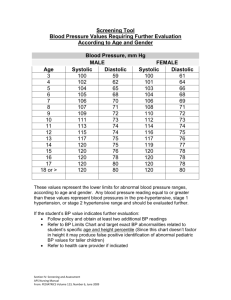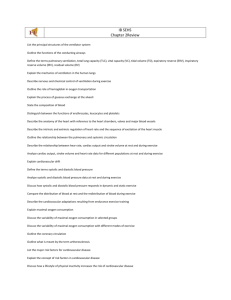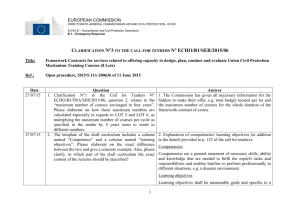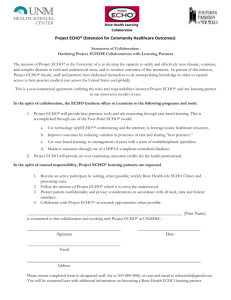Interpreting Echo Reports - London Cardiovascular Clinic
advertisement
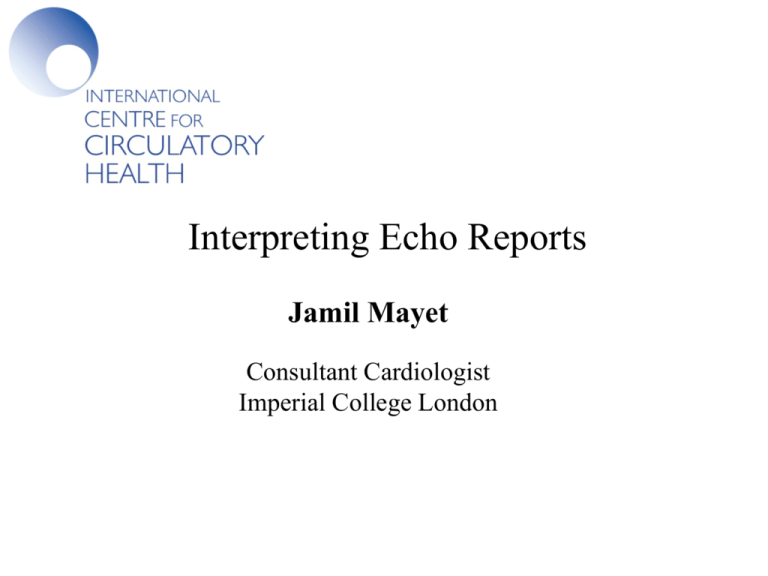
Interpreting Echo Reports Jamil Mayet Consultant Cardiologist Imperial College London ASSESSMENT OF SYSTOLIC VENTRICULAR FUNCTION Le2 ventricular assessment Right ventricular systolic funcCon ASSESSMENT OF LV DIASTOLIC FUNCTION Diastolic heart failure • Up to a third of patients have clinical heart failure with normal LV systolic function • Underlying pathophysiology relates to diastolic dysfunction • Commonest underlying pathologies – Normal ageing, Hypertension, Myocardial ischaemia Le2 Ventricular Diastolic DysfuncCon LV RELAXATION NORMAL IMPAIRED IMPAIRED IMPAIRED LV COMPLIANCE NORMAL NORMAL / ↓ ↓↓ ↓↓↓ ATRIAL PRESSURE NORMAL NORMAL ↑↑ ↑↑↑ Relationship of Pulmonary Capillary Wedge Pressure to E/E' The image cannot be displayed. Your computer may not have enough memory to open the image, or the image may have been corrupted. Restart your computer, and then open the file again. If the red x still appears, you may have to delete the image and then insert it again. Closed circles: Patients with impaired relaxation on echocardiography. Open circles: Patients with pseudonormalization on echocardiography. (Adapted from Nagueh et al. JACC 2003). Relationship between baseline E/E' and cardiovascular outcome in the ASCOT study E/E' E / E ' E / E ' E / E ' <8 8-11 11-14 >14 Number of patients 168 182 69 20 15 14 10 10 8.8 7.7 14.5 50 Number of events % patients who had events Echo Assessment of Left Ventricular Diastolic Function • E/A raCo and DT • E’ • Calculate E/E’ • If doubt – Clinical characterisCcs of paCent – LA size – LV mass – Valsalva – PV flow – Colour M-­‐mode Treatment of diastolic heart failure • Treat underlying cause eg ischaemia • Impaired relaxation – Theoretically rate-limiting agents effective • Beta-blockers, verapamil • Reduce HR and prolong diastole • Reduce myocardial oxygen demand • Lower BP and reduce LVH • Restriction – Drugs which reduce fibrosis and lower LA pressure theoretically should be effective • ACEI, AII blockers, Diuretics – If LA pressure lowered too much cardiac output significantly worsened • Can cause significant morbidity ASSESSMENT OF LV CARDIAC STRUCTURE Hypertensive Heart Disease Echo defini4on of LVH • Healthy cohorts of subjects • No high BP, diabetes, CV disease, obesity • LVH defined as LVMI > mean + 2SD – >116 g/m2 males – >104 g/m2 females • RelaCve wall thickness = 2xPWTd/LVIDd – Increased when 0.43 or more Lang RM et al. J Am Soc Echo 2005; 18:1440-­‐1463 Le8 ventricular geometry Gerdts E. Eur Heart J 2008 4-­‐year age-­‐adjusted cardiovascular mortality Incidence of cardiovascular mortality according to presence or absence of LVH 5 4.5 4 3.5 3 2.5 2 1.5 1 0.5 0 No LVH LVH Men P<0.001 Women P=ns Redrawn from Levy et al, NEJM 1990; 322: 1561-­‐6. Age-­‐adjusted incidence/ 100 subjects 4-­‐year age-­‐adjusted incidence of cardiovascular disease according to LVMI 18 16 14 12 10 Males Females 8 6 4 2 0 <75 75-94 95-116 117- LVMI (g/m2) Redrawn from Levy et al; NEJM 1990; 322: 1561-­‐6. Risks associated with LVM and geometry Total mortality* Cardiovascular events† % paCents 40 30 20 >0.45 <0.45 10 0 >125 <125 >125 <125 LVMI (g/m2) LVMI (g/m2) *P<0.001, †P=0.03 RWT Koren et al. Ann Int Med 1991; 114: 345-­‐352. 3D echo assessment of LV volume and mass Intraobserver variability 2D echo 19% 3D echo 8% Interobserver variability 2D echo 37% 3D echo 7% Mor-­‐Avi V et al. CirculaCon. 2004;110:1814-­‐1818 ASSESSMENT OF THE VALVES Valvular anatomy and funcCon ABBREVIATIONS A GOOD REPORT What makes a good GP echo report All 4 chambers and 4 valves described Simple summary of results Avoid abbreviaCons Results contextualised eg Mild mitral regurgitaCon. No significant valve disease • If significant abnormality, described in summary • If abnormal, advise on acCon • Rapid reporCng and communicaCon • • • • What makes a good GP echo report • Need senior clinical opinion interpreCng / translaCng • Put yourself in the posiCon of the GP • A bad report generates more unnecessary work for everyone • Easy to get descripCons a liole “wrong” even if very experienced • Support for enquiries

